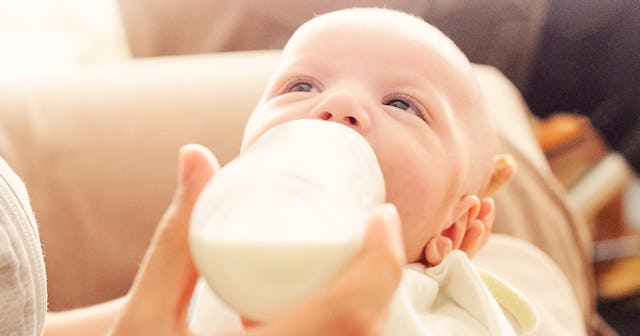To The Mom Who Couldn't Breastfeed

Today, I was at the grocery store when I got into a conversation about breastfeeding with the most unexpected person. He was bagging our groceries at the check-out and couldn’t have been more than 17 years old. My son was in a carrier on my chest and studying the young man with his big blue eyes. He helped us take our groceries to the car and made conversation along the way about his younger sisters. For a teenager, I was surprised with how comfortable he was talking about baby things.
When the conversation turned to the bottles we had just purchased, he gave me a look. Then responded rather emphatically, “My mom breastfed all her kids for as long as she could.” I was so focused on how awkward it felt to be having the conversation with him that I didn’t realize how his response triggered me until hours later. I don’t think he meant it with judgment, but then I had to wonder why he was so matter-of-fact.
Honestly, it was the first time I realized that other people would doubt me when it came to breastfeeding. My family and friends — and even pediatrician — had been so supportive with my efforts and trials and failed attempts that I hadn’t thought about all the people who would look at me and think, What do you mean you “can’t” breastfeed?
AleksandarNakic/Getty
For us, breastfeeding was complicated from the start. We had issues with shallow and painful latching, lip and tongue ties, intense GER (acid reflux), and chronic low milk supply. For over three months, we worked with lactation specialists, nurses, and our pediatrician, implemented strategies from blogs and books, and utilized every resource and tool available to us. It’s challenging for most new moms, but it would come to be a thing I would grieve as we could never make it work.
I genuinely wanted to breastfeed because I believed in the health benefits and the unique bonding experience with my baby, but also, there was this deeply inherent drive to do this thing my body is meant to do. That said, the social and cultural pressure to breastfeed is enough to make any mom experience weighty levels of shame and doubt when she isn’t doing it.
I wrote this article on the 20+ known reasons why some moms can’t breastfeed. Besides circumstances with mom and baby, there are many secondary factors that influence how successful a breastfeeding relationship turns out – support system, early intervention and help, experienced or involved lactation consultants, positive reinforcement from a spouse, time off work, number of children, even pain threshold.
The day I pulled out of that grocery store parking lot, I searched my heart and asked myself, “Did you really try your best?” The answer? Yeah. I tried everything I could. And if I missed something, I didn’t know it at the time. I gave it my best.
You probably won’t run into a possibly 17-year-old bag boy who talks to you about breastfeeding (is it okay if I assume this is very rare?), but you’ll have other critics, including yourself. Just so, I want you to know…
If you gave it your best, but —
You still wonder if you tried everything,
Or you think you could have toughed it out longer,
Or you look back and realize that you didn’t have enough support,
Or you actually know that you quit early for your family or your mental health,
Trust yourself. Trust that you made the best decision with what you had. Letting go is not the same as giving up. What’s best looks different than you thought it would, and that’s okay.
When you see “baby needs the boob” on t-shirts and onesies,
Or you secretly wonder if your baby is missing out on “the gold standard,”
Or you watch another mom effortlessly feed her baby under a flowy cover-up,
It’s okay to mourn the failure of your plans, the death of your expectations, and the loss of this special thing that only moms can do. It’s not a pity party. It’s just acknowledgement that you experienced a loss not often talked about — but still to be grieved.
If you tense at the question, “Are you breastfeeding?” and the assumption that you’re able,
If someone shames you because they think you gave up too soon,
Or a person looks at you funny when you say, “couldn’t breastfeed,”
PhotoAlto/Ale Ventura/Getty
Shake the dust. No one knows what you should be doing with your baby better than you. She was knit to your womb. You know her, even if she feels fragile and complicated right now. And you have to decide what your relationship needs.
Here’s the thing: You didn’t fail. You don’t have to “do more” in other areas because you couldn’t breastfeed. This doesn’t say anything about your ability or capacity or worth as a mom. You are just the right fit and totally enough for your baby. And whether you give him donor milk or pumped milk or formula, your love — not your milk — is the gold standard.
This article was originally published on